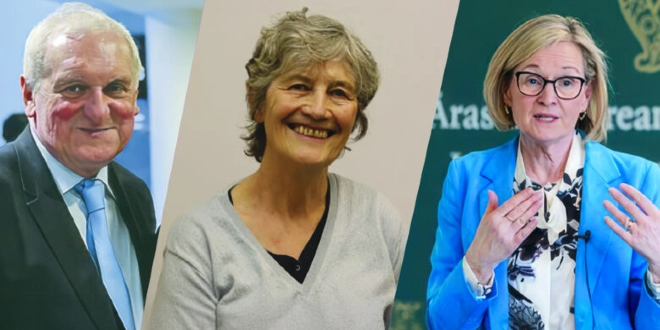As Ireland’s presidential race nears its conclusion, campaigners are bracing for a tense final week marked by controversy, sharp exchanges, and a sense that—despite the polls—nothing is guaranteed.
A Campaign of Twists and Tension
This election has been anything but predictable. Opinion polls indicate Catherine Connolly maintains a strong lead, yet both campaigns insist the outcome is far from settled. Over the weekend, Heather Humphreys escalated her attacks, demanding “straight answers” from Connolly about her previous work as a barrister representing banks in repossession cases. Connolly dismissed the criticism as “a new low,” signaling the increasingly combative tone of the campaign’s final phase.
With just four days left before voting, both camps are intensifying their efforts. While Connolly seeks to defend her lead and broaden her appeal, Humphreys hopes a late surge among centrist voters could upset the race.
The Last Debate
All eyes now turn to the final presidential debate, airing Monday night at 9:35 p.m. on RTÉ’s Prime Time, hosted by Miriam O’Callaghan and Sarah McInerney. The showdown will be broadcast live on RTÉ One and the RTÉ Player and is expected to be pivotal in shaping late voter sentiment. For many undecided voters, this may be the final opportunity to assess the candidates side by side.
Polling Day Details
Polling stations open Friday, October 24, from 7 a.m. to 10 p.m. Across the country, approximately 3.6 million people are eligible to vote. While a polling card isn’t required, voters are advised to bring valid identification. Those unsure of their polling location can confirm details at checktheregister.ie.
The Electoral Commission estimates that over 60,000 first-time voters have turned 18 since last year’s general election, while an additional 61,000 people have newly registered. Their participation could play a decisive role in what is expected to be a closely watched contest.
Turnout and the Stakes
Turnout will be a crucial factor. In the 2018 presidential election, just 44% of eligible voters cast ballots—a figure Connolly’s campaign hopes to surpass by mobilizing young and progressive voters. Polling suggests Connolly currently commands around 38% support, though her team insists enthusiasm among younger demographics could push that number higher.
Meanwhile, Heather Humphreys—the Fine Gael candidate—aims to rally moderate voters disillusioned by Fianna Fáil’s chaotic handling of the Jim Gavin candidacy collapse. With Gavin’s withdrawal still fresh, Humphreys is positioning herself as the sole centrist choice, hoping to consolidate support from across the political spectrum.
The Count and What Comes Next
Ballot counting begins Saturday, October 25, with local counts held across the 43 constituencies before final tallies are sent to the national center at Dublin Castle. In Dublin, counts will be conducted at the RDS, while in Cork, the venue will be Nemo Rangers.
Results are expected to emerge gradually throughout the day, with early tallies likely by lunchtime. However, delays may occur if spoiled ballots are higher than usual. Historically, around 18,000 ballots—just over 1%—have been invalidated in past elections. Yet, a recent Irish Times/Ipsos B&A poll found that 6% of voters plan to deliberately spoil their ballots this time, which could mean upwards of 75,000 papers requiring individual review.
An official declaration is expected before the Nine O’Clock News on RTÉ One, though clear trends should be visible well in advance. Candidates must reach 12.5% of the national quota to qualify for expense reimbursement, up to €250,000.
Transition of Power
President Michael D. Higgins will conclude his historic 14-year tenure on Monday, November 10, marking the constitutional maximum of two terms. Should any unforeseen event occur before the new president’s inauguration, the Presidential Commission—consisting of Chief Justice Donal O’Donnell, Dáil Ceann Comhairle Verona Murphy, and Seanad Cathaoirleach Mark Daly—would temporarily assume presidential duties.
This mechanism also applies if an elected president, such as Jim Gavin in a hypothetical scenario, were to resign before taking office. In such a case, a new election would be held within 60 days.
Inauguration Ceremony
The inauguration of Ireland’s 10th President is scheduled for Tuesday, November 11, in St. Patrick’s Hall at Dublin Castle. The event will be attended by representatives from both the Oireachtas and the Judiciary, following long-standing tradition. Once the new president is sworn in, the clock will begin ticking toward Ireland’s next presidential election—set for 2032.
 The Daily Star Ireland
The Daily Star Ireland

